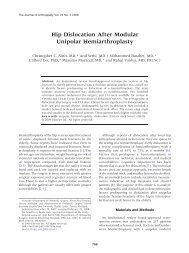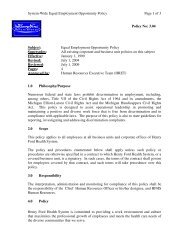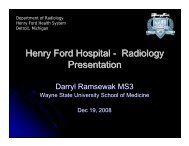Fall 2010 - Henry Ford Health System
Fall 2010 - Henry Ford Health System
Fall 2010 - Henry Ford Health System
- No tags were found...
You also want an ePaper? Increase the reach of your titles
YUMPU automatically turns print PDFs into web optimized ePapers that Google loves.
Program Spotlight(Continued from Page 3)less risk for stroke and heart attack,and live longer and more functionallives.”“We have demonstrated that we’renot compromising cancer cure byremoving only part of the kidney.”While Dr. Rogers’ commitment topartial nephrectomy makes his jobmore challenging, the robot makes hisgoal more achievable.“Partial nephrectomy is technicallychallenging because we need toclamp the kidney’s blood vesselswhile cutting the tumor out andsuturing the organ back together, allwithin a time limit” says Dr. Rogers.“After 30 minutes of clamping, thekidney is put at risk. The robot helpsus to achieve these goals.”Dr. Rogers joined <strong>Henry</strong> <strong>Ford</strong> in 2007following a kidney cancer surgeryfellowship at the National CancerInstitute, where he helped develop theNCI’s robotic kidney surgery program.In fact, he may be the only surgeonin Michigan who has completed afellowship in robotic kidney surgeryand advanced laparoscopic kidneyand adrenal surgery.Dr. Rogers was the first surgeonto publish a study on partialnephrectomy of complex kidneytumors and has since published 25papers on robotic kidney surgery. Hecontinues to actively research roboticprocedures and their outcomes,and collaborates with other leadinginstitutions including WashingtonUniversity and The Cleveland Clinicon robotic kidney surgery research.Robotic Bladder SurgerySince 2003, surgeons at theVattikuti Urology Institute havebeen advancing minimally invasive,robotic cystectomy for people withbladder cancer.Craig Rogers, M.D.The VUI team performed one ofthe nation’s first robotic-assistedprocedures with reconstruction forbladder cancer, and continues to treatmore bladder cancer patients thanmost urologists.As with robotic prostate and kidneysurgery, robotic bladder surgeryoffers smaller incisions, which sparemore tissue and nerves, carry lessrisk of post-operative infections andcomplications, and result in a fasterrecovery.“Not so long ago, traditionalcystectomy involved notable tissueand nerve damage, and significantblood loss,” says Piyush Agarwal,M.D., director of VUI’s robotic bladdercancer program. “Now we can offera faster recovery, an earlier return ofurinary control, and nerve-sparingtechniques in men that help preservesexual function.”“Surgeons at the Vattikuti UrologyInstitute are the most experiencedin the world operating on urologiccancers with the da Vinci Surgical<strong>System</strong>,” continues Dr. Agarwal. “Ourbladder cancer patients benefit fromour robotic surgery experience, aswell as our collaboration with themultidisciplinary care team at theJosephine <strong>Ford</strong> Cancer Center, toemploy the latest therapies before orafter surgery.” ●For more information on robotickidney and bladder surgery, go tohenryford.com/vui or call 1-888-881-1117.15
















